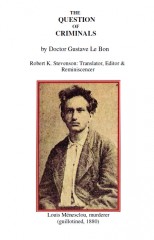
Author : Le Bon Gustave
Title : The Question of Criminals
Year : 1880
Link download : Le_Bon_Gustave_-_The_Question_of_Criminals.zip
Utilizing the resources of present-day scientific methods, we propose to consider here under the above title an important anthropological and social question, one which is hardly being studied nowadays by jurists, philosophers, and historians. The main preoccupation of any science is always to define its aim. Definitions elicited from etymology come easily, but are generally insufficient because the object of every science, including those which seem the most organized, such as physics, for example, varies from each epoque according to the tendencies of the moment. Anthropology is, as its name indicates, the study of man. Social science--or if one prefers another word, sociology-is the study of societies. However, these concise definitions cast a very misleading light. For where does the science of man begin or end? Physiology, anatomy, pathology, archeology, history, etc., with each one forming a part of the field of anthropology, it is indeed difficult to name many sciences that are not attached to this field by sorne bond. Furthermore, a professional anthropologist recently asserted that music and sculpture also comprise part of the anthropological sciences. They undoubtedly are connected by the same right that unites linguistics and demography to the sciences of man. Additionally, chemistry, which reveals tous the composition of our tissues, and the art of nutrition, which supplies us the means to restore our tissues' !osses, can likewise be associated with anthropology. Looked upon in this way, anthropology will soon become nothing but an aggregate of disparate sciences and will end up disappearing for lack of an aim or purpose. In fact, it is only necessary in any science to search for those things that are really vital in promoting its development, and not those which tend to stifle it. The anthropology of the ancients, because it had little time to gain experience, only concemed itself with moral man. The new anthropology of today only occupies itself with anatomical man. It has entirely abandoned the study of the intellectual functions, so much so that the professional anthropologist cited above does not himself make mention of psychology (although he includes music and sculpture) in the quite diversified list of anthropological sciences. In order to pass judgment on the tendencies of modem anthropology, it is necessary then to study the works of anthropologists; however, nothing more than a quick glanee is sufficient in order to leam that the principal object of their research is the study of human races. What anthropologists generally study the most in human races are variations of the skeleton's shape, particularly those relating to the skull. Such an examination certainly qualifies as a useful task, for it's better to provide value by affixing precise notions upon a small nook of science, no matter how limited this nook may be, than it is to toss out vague generalities lacking any firm basis; it is a task, though, which anthropology, under penalty of being soon considered as only a branch of osteology and by consequence losing ali credit, should not confine itself to for much longer. lndeed, pretending to understand a man just by studying his remains or skin color, this requires one to imagine and make sense out of a table containing a chemical analysis of ali the colors which have served to constitute the man. The fact of the matter is, understanding the psychology of an individual will always be more important than knowing about his skeleton. Our current classifications of the human races are obviously quite provisional and cannot withstand anything more than a superficial examination; but, since we are obliged to content ourselves with these provisional classifications, they will better merit being divisions if they were founded upon the moral and intellectual aptitudes of diverse human groups than if they are fundamentally based on qualities as secondary as the shape of one's hair (which sorne truly childish classifications emphasize ). As for sociology, it is definitely still far from being able to lay claim to the title of science, because up to now it has hardly attempted to delineate anything but highly insufficient rough outlines. lt is a science that really has not been born yet and which we see breaking through the horizon with difficulty. Sociology is not open to further development until anthropology-and 1 mainly intend here by "anthropology" the study of the comparative psychology of races-has left its period of infancy where it currently still finds itself. Within these new sciences in the process of formation each one is able to communicate its ideas, but chiefly the facts and methods that it commands. The future will easily separate out what is useful from that which only merits oblivion. ln entertaining in this Revue questions which seem to us to faU under the purview of the two sciences that we have seen to enumerate and to which we have devoted our most recent work, we do not bring with us any preconceived ideas or doctrinal ties. This is because we have striven to remember that if it is always indispensable to have a method, it is often fatal to possess a doctrine. Although physical man will be studied, we shall also study moral man (an endeavor so disdained nowadays by anthropologists). If we only had in hand the antiquated methods of the old out-of-date psychology, then it is with reason that our study could be considered as undeserving of one's attention. But, the methods we shall use owe their existence to the work of the physiologists, whose methods enable one to approach the study of man with the precision that modern scientists employ in the study of any sort of physical phenomenon; regrettably, despite their great utility, the methods of the physiologists continue to be ignored by France's classical education system. We shall today only consider a single question: that concerning criminals. ...

Palmer Michael - Hiroshima revidiert
Author : Palmer Michael Title : Hiroshima revidiert Die beweise für napalm und senfgas anstatt...














